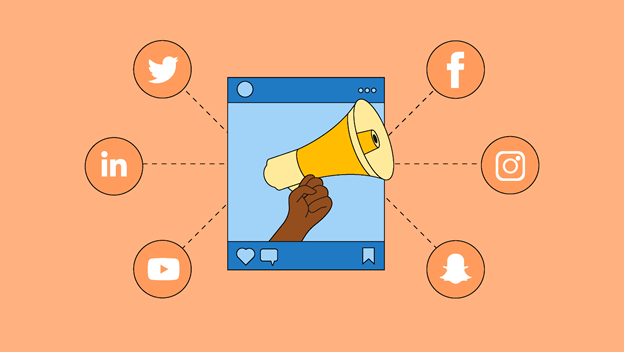The Impact of Social Media on Influencer Marketing Campaigns
In the ever-evolving landscape of digital marketing, influencer marketing has emerged as a powerful strategy to reach and engage with target audiences. However, the effectiveness of influencer marketing campaigns is significantly influenced by social media algorithms. In this blog, we’ll explore the profound impact that social media algorithms have on influencer marketing campaigns and how brands can navigate these algorithmic challenges to achieve their marketing objectives.
The Rise of Influencer Marketing
Influencer marketing, once considered a niche approach, has now become a mainstream advertising strategy. Brands collaborate with individuals who have amassed significant followings and credibility in specific niches or industries, leveraging their influence to promote products or services. These influencers can sway consumer behavior and shape opinions, making them valuable assets for brands seeking to connect with their target audiences.
The Role of Social Media Algorithms
Social media platforms play a pivotal role in influencer marketing campaigns, serving as the primary channels for content distribution. However, these platforms employ complex algorithms that dictate what content users see on their feeds. Understanding how these algorithms work is crucial for both influencers and brands to maximize the impact of their campaigns.
- Content Relevance and Engagement:
Social media algorithms prioritize content that is likely to be relevant and engaging to individual users. This means that influencer marketing campaigns must produce content that resonates with the target audience to ensure it appears on their feeds. The more engaging the content, the more prominently it is featured.
Video marketing services play a pivotal role in this landscape, offering the ability to create visually captivating and engaging content that stands out amidst the noise of social feeds. By leveraging professional video production, influencers can enhance their campaigns, ensuring that their content not only reaches but also resonates with their target audience, thus maximizing visibility and impact.
- Consistency and Frequency:
Algorithms reward consistency in posting and engagement. Influencers and brands that maintain a regular posting schedule and interact with their followers are more likely to see their content reach a broader audience.
- Quality Over Quantity:
Algorithms have become adept at identifying low-quality, spammy, or clickbait content. This shift places a premium on high-quality, authentic content that provides value to users.
The Algorithmic Challenge
While social media algorithms aim to improve user experience by showing them content that is relevant and engaging, they can pose challenges for influencer marketing campaigns:
- Decline in Organic Reach:
The days of organic reach on social media are dwindling. Content from influencers and brands alike is competing for limited space in users’ feeds. As a result, organic reach has declined significantly, making it more challenging to reach audiences without paid promotion.
- Algorithmic Changes:
Social media platforms frequently update their algorithms. These changes can lead to sudden drops in visibility, forcing influencers and brands to adapt quickly to maintain their reach and engagement.
- Algorithmic Bias:
Algorithms may inadvertently favor certain types of content or accounts, potentially disadvantage sizing smaller influencers or niche markets.
Strategies for Navigating Social Media Algorithms in Influencer Marketing
In light of these algorithmic challenges, it’s essential for influencers and brands to adopt strategies that maximize the impact of their influencer marketing campaigns:
- Quality Content is Key:
To beat algorithmic filters, prioritize creating high-quality, engaging, and relevant content that resonates with your target audience.
- Leverage Paid Promotion:
Paid advertising and promotion can help expand the reach of influencer marketing campaigns beyond organic limitations. Influencers and brands should allocate a budget for paid ads to ensure content reaches a broader audience.
- Engagement is Vital:
Encourage audience engagement by responding to comments, asking questions, and fostering a sense of community. The more engagement your content generates, the more likely it is to appear in users’ feeds.
- Stay Informed About Algorithm Changes:
Keep up-to-date with social media algorithm updates and adapt your strategy accordingly. Understanding how these changes affect content visibility can help you stay ahead of the curve.
- Diversify Across Platforms:
Relying on a single social media platform can be risky. Diversify your influencer marketing efforts across multiple platforms to mitigate the impact of algorithmic changes on any single channel.
- Collaborate with Influencers Skilled in Algorithm Management:
Choose influencers who are knowledgeable about social media algorithms and have a track record of effectively managing their content to beat algorithmic challenges.
Let’s examine a real-world example of a brand that successfully navigated algorithmic challenges in influencer marketing.
A fashion retailer, faced a significant drop in organic reach due to a social media algorithm update. Instead of panicking, they doubled down on content quality and community engagement. They encouraged their influencer partners to create visually appealing and authentic content that encouraged audience interaction. Additionally, they allocated a portion of their marketing budget to paid promotion to ensure their influencer-generated content reached a broader audience.
The results were impressive. Despite the algorithmic changes, saw a 30% increase in engagement and a 20% growth in followers within just three months. By adapting to the evolving social media landscape and focusing on quality content and engagement, they not only weathered the algorithmic storm but thrived.
Conclusion
Influencer marketing campaigns must contend with the ever-changing landscape of social media algorithms. While these algorithms can present challenges in terms of organic reach and visibility, they also reward quality, engagement, and adaptation. By creating authentic, high-quality content, leveraging paid promotion, and staying informed about algorithmic changes, brands and influencers can navigate these challenges effectively and continue to harness the power of influencer marketing to connect with their target audiences. In an era of algorithmic unpredictability, the key to success lies in adaptability and creativity.
